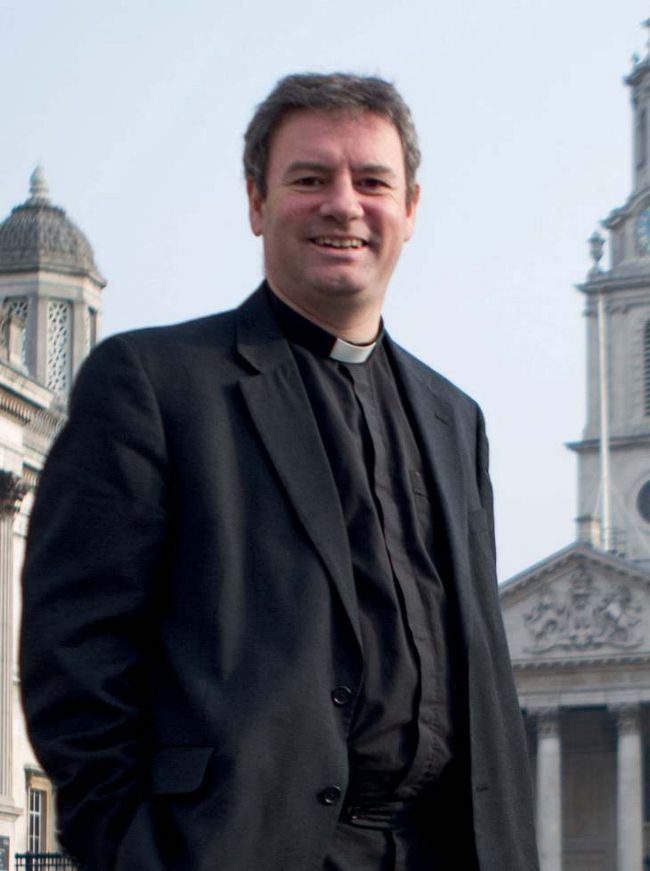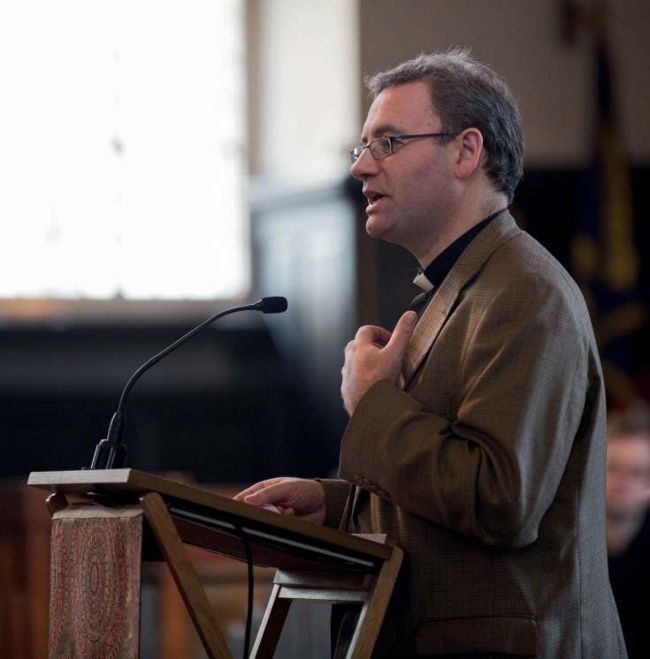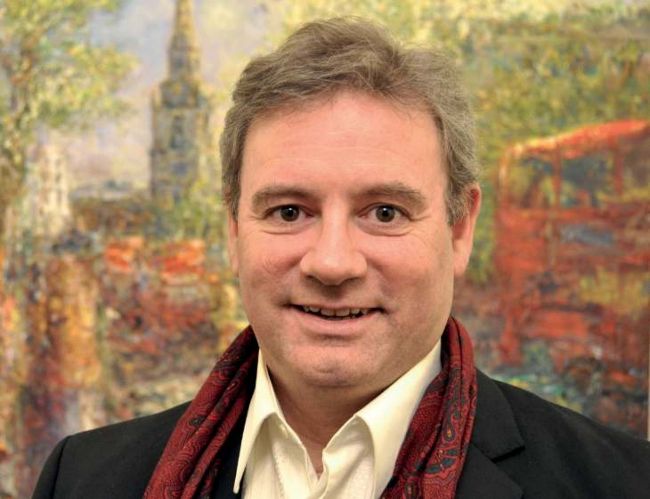‘God is the heart’
Jackie Macadam describes the life of the Rev Dr Sam Wells, vicar of St Martin-in-the-Fields Church in London and learns about the church’s work with those on the margins and the ecumenical HeartEdge movement.
THE Rev Dr Sam Wells is fondly reminisicing about his time in Edinburgh.
“New College was a wonderful experience. I had a good liturgically formed grounding at Coates Hall, and at New College I found teachers who were genuinely interested in their students and subjects that I believed really mattered and a group of people my own age (mid-twenties) who’d all seen a bit of life and had returned to study in a diff erent frame of mind,” he says.
“They were three great years and I was blessed by teachers like Duncan Forrester and John O’Neill, Bruce McCormack and Kevin Vanhoozer. I found my intellectual sweet spot in a way I’d never done in Oxford, and after ordination in Newcastle I continued studying for a PhD part-time in Durham. For my professional life, going to Edinburgh was probably the most significant thing I ever did.”
Reflecting on his early life, he explains: “My father was third-generation ordained in the Church of England. He went to Oxford and interrupted his studies to serve in the Middle East, Africa and Italy in WW2.
“It was a family that knew a lot of tragedy – two of his siblings died when their children were very young,” Sam says. “My mother’s parents were Jews from Kiev who converted to Christianity as teenagers and left Soviet Ukraine in the twenties. My mother was born in Berlin in 1930 and the whole family were refugees to England in 1938. She had a good deal of tragedy too, losing two children at birth and dying relatively young when I was 18. I was born in Canada while my parents were spending a year there recovering from the grief of their double bereavement.
“I grew up in Saltford, between Bath and Bristol, where my father was rector for 30 years. Church was the heart of our life, and the church family gathered around us in my mother’s last illness – though in truth she was ill for almost all of my growing up. I was given roles in worship and youth ministry and leading bible studies and was quite used to church leadership, in a very modest way, by the time I left school.
“I perhaps had only one churchgoing friend, so I never inhabited an environment where churchgoing was normal. I remember my history teacher poo-pooed the idea of my studying theology at university: he didn’t think it was a serious subject. I got a scholarship to Merton College, Oxford to read history and set out for a nine-month break before taking up my studies. I spent six weeks on a kibbutz in Israel which I found painfully secular and disillusioning. During that time, while working in a factory, I had a very clear realisation I was going to be a priest. The problem with that was it made me look less seriously on my forthcoming studies. I came home hurriedly to be present as my mother’s life came to an end.
“Oxford was a mixed experience. My interests had turned to theology and I found a lot of the history course obscure. It wasn’t the intellectual feast I was anticipating. There were many joys but overall I found it confusing as far as finding my identity. Much happier and more straightforward was a year in inner-city Liverpool. It was just after the 1980s riots and Faith in the City, and I felt I was doing simple honest work (although I was living on the dole) and engaging the real issues of the church. It was a huge relief after the previous three years of confusion.
“For me, the gospel has always been wrapped up with issues of poverty. I’ve served 10 years in socially deprived areas and when I’ve been in other settings (like my current one) relating to poverty has remained a pervasive theme. During my time in Norwich (1997-2003) I began to realise that poverty wasn’t fundamentally about money. That discovery has been crucial to all my work since.
“Between 2005 and 2012 I lived in the USA and travelled coast-to-coast, seeing the town of my birth and meeting many relatives, including some who had escaped Soviet Russia and were living in Chicago. “On my return I worked as a chauff eur for Peter Ball, the monk-bishop who was later imprisoned for sexual assault. I was not the victim of assault but in retrospect I realise I had some awareness of things that today would be considered highly inappropriate, and the experience has aff ected me in a number of ways.”
Turning to deeper church issues, Sam will deliver the biennial Chalmers Lectures in Edinburgh later this year.

The Rev Dr Sam Wells
For my professional life, going to Edinburgh was probably the most significant thing I ever did.”
He is also familiar to those who attended the General Assembly of 2017 when he was a panellist at a special session entitled ‘Catalysing Kingdom Communities’.
“A lot of people seem to have woken up to issues of mission and evangelism in the last 10-20 years as the statistics for those attending worship have nosedived. For me it hasn’t made a great deal of diff erence. I have no nostalgia for a time when the church somehow got it right. God has always renewed the church through the kingdom – through the activity of the Holy Spirit beyond the confines of the church. We go into the ‘world’ not to make it into the church but to discover what the Spirit is doing and to join in. You can call that mission if you like but really it’s another kind of worship. In church the danger is we get to imagine God too much in our own image, but in mission we see God in all the many diverse ways God’s face appears.
“There have always been settled,
parochial-style ministries based around geographical stability; but there have also always been more improvisatory, experimental forms of ministry – take the Benedictines and the Franciscans as a classic historic contrast. It will always be so. Israel was itinerant and then it was settled in the promised land and then it was on the move again to Babylon. Who is to say which was the ‘right’ model? But the irony of the Old Testament is that Israel was closer to God in Babylon than it had ever been in the promised land.”
Turning to St Martin’s-in-the-Fields and HeartEdge, he explains: “The uniqueness of St Martin’s lies not so much in its geographical location, royal connections and broadcasting profile, nor in the extent and breadth of its operations, but in the way its activities and commitments catalyse and enhance each other.
“HeartEdge draws on the commercial enterprise we set up to create a sustainable financial background for our church. In a nutshell, HeartEdge is about churches being able to maintain their ministry and extend their mission while paying the bills. “Set up in 1987, the commercial enterprise continues to grow in profile and operations. St Martin-in-the-Fields describes itself as ‘a community of hope, reimagining church and society through compassion, commerce, culture and congregational life’ (the 4Cs).
“The vision of the community is, ‘At the Heart. On the Edge.’ St Martin’s is at the heart of London and at the heart of the establishment. Theologically, St Martin’s exists to celebrate, enjoy, and embody God being with us – the heart of it all. This is not a narcissistic notion that we are the heart, but a conviction that God is the heart and we want to be with God. Meanwhile the word ‘heart’ refers to feeling, humanity, passion, emotion. It means the arts, the creativity and joy that move us beyond ourselves to a plane of hope, longing, and glory. It means companionship, from a meal shared in the café or a gift for a friend perhaps bought in the shop. At the heart means not standing on the sidelines, telling the government what to do, but getting into the action, where honest mistakes are made but genuine good comes about, where new partners are found and social ideas take shape.

The Rev Dr Sam Wells
“The edge refers to the edge of Trafalgar Square, looking over its splendour and commotion, pageant and protest. But theologically the word ‘edge’ speaks of the conviction that God’s heart is on the edge of human society, with those who have been excluded or rejected or ignored. St Martin’s isn’t about bringing those on the imagined ‘edge’ into the exalted ‘middle’; it’s about saying we want to be where God is, and God’s on the edge, so we want to be there too. Being on the edge does mean facing the cost of being, at times, on the edge of the church. Some of the issues we care deeply about are not areas of consensus in the church. We aim to practise what we believe is a true gospel where we receive all the gifts God is giving us, especially the ones that the church has for so long despised or patronised. But the ‘edge’ also means a leading edge, perhaps a cutting edge with an outstanding music programme, a green footprint, and an eye for issues around disability. In particular it means a commercial enterprise that’s integrated into the life of the church community and, rather than simply being a source of funds, is at the forefront of the congregation’s interface with London’s civil economy.
“Being a social enterprise keeps the institution close to the uncompromising realities of the economic climate, geopolitical tensions, and tough commercial choices. St Martin’s is exposed to major public events and trends. It has members of staff from 25 countries, and is thus closely aff ected by Brexit and changes in migration patterns. It relies on income from tourists and other visitors, and has thus experienced downturns triggered by terrorist incidents in central London. Meanwhile it has to make judgements about what it means for its business to be an exemplary organisation when the wider institution depends for its survival on the profits it makes. Moving to the London Living Wage was costly but unquestionably the right thing to do.’
Sam is looking forward to delivering the Chalmers Lectures later this year. “I’ve got a lot of friends in Scotland in general and Edinburgh in particular, partly from my New College connections. I think the Church of Scotland has a lot of respect for people who are committed to parochial ministry but have a lot of investment in academics and expressing the gospel in the public sphere.
“So when I came back from the US in 2012 I started getting quite a few invitations to speak in Scotland, which culminated in being asked to address the General Assembly of the Church of Scotland in 2017. During that address I explored the theology of HeartEdge. Afterwards some influential people in the Kirk said, more or less: ‘We would hear more of you on this matter.’ It’s also been the practice as long as I’ve been at St Martin’s for the Moderator to spend an hour or two with me as part of his or her November visit to London, so I’ve had the privilege of talking with a series of inspiring leaders about past, present and future. I plan to use the lectures to give an idea how to use what we’ve learned.”
A prolific writer, Sam has written several books, many dealing with ethics and is a member of the Multistakeholder Council that seeks to work with the Council for Global Problem-Solving to make the G20 process more reflective of the concerns and realities of civil society, rather than dominated by economists.
“It’s only a year old and it’s early days yet.” Sam says. “I’ve been privileged to attend events in Berlin and Buenos Aires and to off er papers and addresses on themes including social cohesion and the media.
I’ve met, for example, the German Chancellor and the Argentine President and had an insight into the workings of these large global gatherings.”
But Sam’s heart lies with his family, wife Jo, an Anglican Bishop, his teenage children “who don’t take us too seriously” and with his church, St Martin’s.
“It’s not that unusual for a church to run a business, although most outsource the operations to an external provider. It’s not unusual for a church to run a significant arts programme, although not on the scale of 170 ticketed and 230 free concerts a year, with major art commissions and exhibitions.
It’s not unusual for a church to be closely associated with a homeless centre or some other way to engage seriously with a pressing social issue through voluntary and professional action.
“The uniqueness of St Martin’s lies in the way its activities and commitments catalyse and enhance each other.”

The Rev Dr Sam Wells
The uniqueness of St Martin’s lies in the way its activities and commitments catalyse and enhance each other.